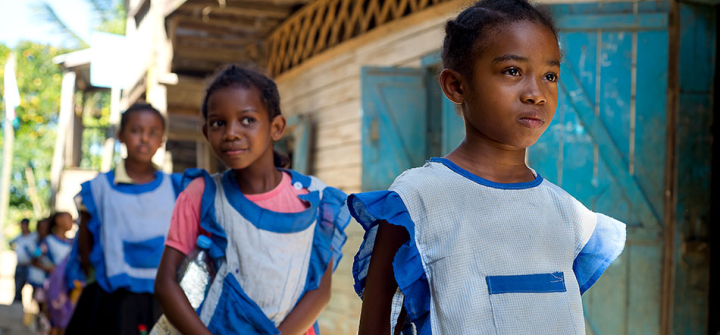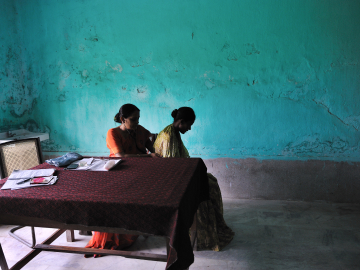Winning the Global War against Neglected Tropical Diseases
Neglected tropical diseases—a group of parasitic, bacterial, and viral infections affecting more than 1.7 billion people globally—have held back human progress for millennia, disabling, debilitating, and causing early death if left untreated. Yet NTDs struggle to attract political prioritization and remain largely unknown and under-addressed.
Africa alone bears approximately 40% of the global burden. People living with NTDs, such as intestinal worms, bilharzia (schistosomiasis) and trachoma, often suffer from poor quality of life—missing school regularly, struggling to keep their jobs, and experiencing societal stigmatization.
Public health efforts to improve the quality of life and eliminate these diseases can reduce the cycle of poverty, research shows—with incremental benefits including economic gains for countries, improved earnings potential for treatment recipients, and improved educational outcomes for children. Therefore, it is important that local and national leaders act now, especially since these diseases are easily treatable.
The WHO 2012 Roadmap to end NTDs set out global targets and milestones to guide the effort to end these diseases. In response, global stakeholders—countries, pharmaceutical companies, and the global health community—strengthened their commitments by signing the London Declaration on Neglected Tropical Diseases in 2012, pledging to control or eliminate 10 NTDs by 2020. In addition, pharmaceutical companies collectively agreed to sustain and expand drug initiatives to deliver essential NTD treatments.
Nearly a decade later, the effort, which seemed an ambitious dream when it launched in January 2012, has measurably improved the lives of many:
- 42 countries have eliminated at least 1 NTD.
- 600 million+ people no longer require treatment.
- 1 billion+ people have been reached with preventive treatments annually for the last 5 consecutive years.
- Billions of dollars have been donated in drug treatments.
The 2012 London Declaration, which encouraged unprecedented global action and progress in the fight against NTDs, officially expired in 2020. Now, the WHO's new 2030 roadmap outlines the next steps towards a healthier future without NTDs—a future that accelerates progress towards disease elimination through multisectoral collaboration between country governments, implementing organizations, donors, industry, research, and academia.
However, without increased understanding of the economic burden these diseases place on countries, and greater action from local governments and national stakeholders, we will not see an end to the scourge of these diseases. NTDs need to receive higher priority on the national and global agenda, through processes such as regional/national strategic planning, domestic financing, and capacity strengthening for NTD programs—all aimed at ameliorating the quality of life for people living with these diseases.
In June 2021, on the sidelines of the Commonwealth Heads of Government Meeting in Kigali, Rwanda will host a global Summit on Malaria and NTDs, providing an opportunity to galvanize renewed support and push for the elimination of NTDs. Government, private and multi-sector leaders will set the agenda for the next decade in the global fight against NTDs—and drive the political and multi-sectoral investment and action needed to catalyze greater endemic country ownership and participation, from the policy, programmatic, and financial perspectives.
We anticipate that after the summit in Kigali, all efforts will be aligned with the WHO 2030 Roadmap so that 90% of people who require treatment for at least 1 NTD can receive treatment by 2030. That will require scaling up treatment delivery to reach underserved communities.
More than ever, there is the need to mobilize the resources, political and community commitment, along with the collaborative action required to end unnecessary suffering from NTDs.
To accomplish this, local and national leaders will have to intensify advocacy efforts and re-energize stakeholders to rally forward towards achieving WHO 2030 NTD targets.
Moses John Bockarie, PhD, FRCP is the regional director for Africa at the European & Developing Countries Clinical Trials Partnership (EDCTP) and an adjunct professor at the School of Community Health Sciences, Njala University, Sierra Leone. He is also a board member of the END Fund—the only private philanthropic initiative solely dedicated to ending the most common neglected tropical diseases.
Join the 50,000+ subscribers in 170+ countries who rely on Global Health NOW summaries and exclusive articles for the latest public health news. Sign up for our free weekday enewsletter, and please share the link with friends and colleagues: https://www.globalhealthnow.org/subscribe
Sudents line up at a primary school in Brickaville, Madagascar to receive treatment for intestinal worms, November 2020. Image: The END Fund / Viviane Rakotoarivony





